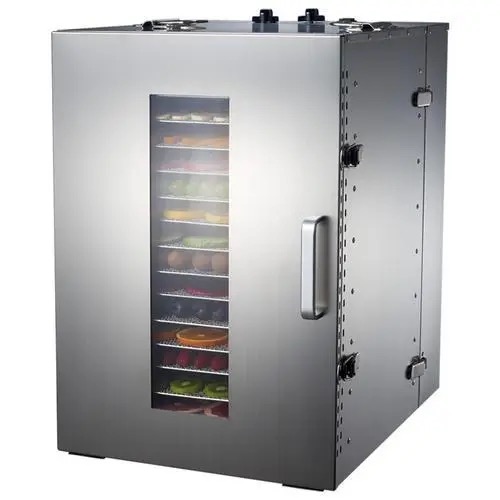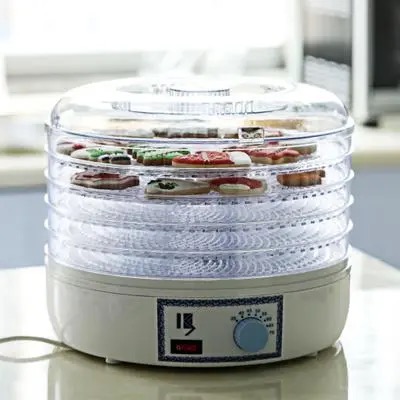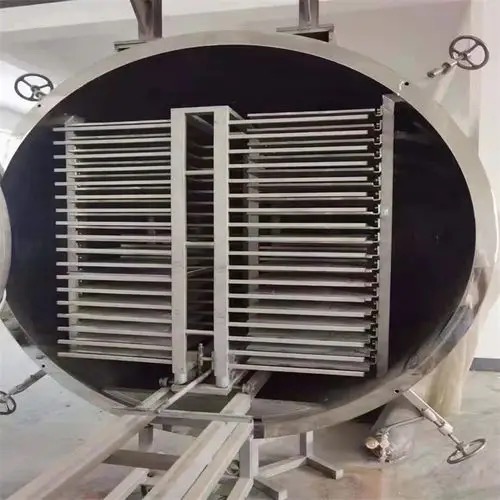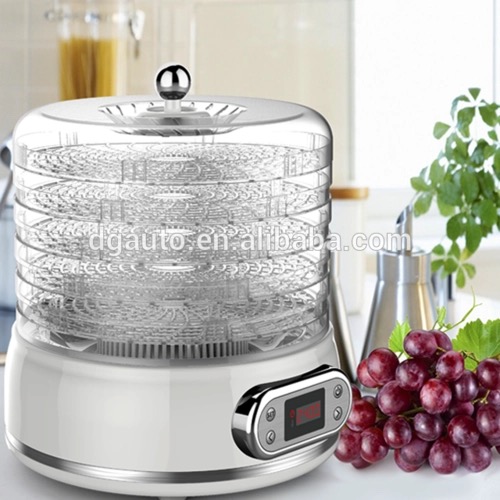
Content Menu
● Introduction to Fruit Dehydration
● The Rise of Fruit Dryer Machines in the Philippines
>> Why Choose a Fruit Dryer Machine?
● Types of Fruit Dryer Machines Available in the Philippines
>> Home Food Dehydrators
>> Commercial Food Dehydrator Machines
>> Industrial Fruit Drying Machines
● Features to Look for in a Fruit Dryer Machine
● Popular Brands of Fruit Dryer Machines in the Philippines
● How to Use a Fruit Dryer Machine Effectively
● The Science Behind Fruit and Vegetable Drying Technology
● Economic Benefits of Investing in a Fruit Dryer Machine
● Maintenance and Care of Your Fruit Dryer Machine
● Creative Uses for Your Fruit Dryer Machine
● The Future of Fruit Drying Technology in the Philippines
● Conclusion
● Frequently Asked Questions
>> Q1: What is the average cost of a fruit dryer machine in the Philippines?
>> Q2: How long does it take to dry fruits in a dehydrator?
>> Q3: Can I use a fruit dryer machine to make beef jerky?
>> Q4: How do I clean my fruit dryer machine?
>> Q5: Are dried fruits as nutritious as fresh fruits?
Introduction to Fruit Dehydration
In the lush tropical paradise of the Philippines, where an abundance of fruits and vegetables grows year-round, preserving this natural bounty has become increasingly important. Enter the fruit dryer machine, a revolutionary appliance that has taken the Philippine market by storm. Whether you're a home cook looking to extend the shelf life of your garden produce or a business owner aiming to capitalize on the growing demand for healthy snacks, a fruit dehydrator is an invaluable tool in your kitchen arsenal.
The Rise of Fruit Dryer Machines in the Philippines
The Philippines, with its rich agricultural heritage, has seen a significant uptick in the use of fruit dryer machines. From small home units to large commercial food dehydrator machines, these devices are transforming the way Filipinos preserve their harvest and create value-added products. The versatility of these machines extends beyond just fruits; they're equally adept at drying vegetables, herbs, and even meats, making them a multi-purpose addition to any food processing setup.
Why Choose a Fruit Dryer Machine?
Opting for a fruit dryer machine in the Philippines offers numerous benefits:
1. Preservation of nutrients: Dehydration retains most of the nutritional value of fruits and vegetables.
2. Extended shelf life: Dried foods can last for months without refrigeration.
3. Space-saving: Dehydrated foods take up less storage space than fresh produce.
4. Cost-effective: Reduce food waste by preserving excess harvest.
5. Versatility: Create a wide range of products, from dried mango to vegetable chips.
Types of Fruit Dryer Machines Available in the Philippines
Home Food Dehydrators
For individuals and small families, home food dehydrators are an excellent entry point into the world of food drying. These compact units are perfect for drying small batches of fruits, vegetables, and herbs. Many models available in the Philippines feature multiple trays, adjustable temperature controls, and transparent covers to monitor the drying process.
Commercial Food Dehydrator Machines
Businesses looking to scale up their production can invest in commercial food dehydrator machines. These industrial-grade units offer larger capacities, more precise temperature controls, and faster drying times. In the Philippines, you can find stainless steel fruit dryers with capacities ranging from 10 to 32 layers, capable of processing large quantities of produce efficiently.
Industrial Fruit Drying Machines
For large-scale operations, industrial fruit drying machines are the go-to choice. These high-capacity units are designed for continuous operation and can handle tons of produce daily. They often incorporate advanced features like humidity control and automated loading systems, making them ideal for commercial fruit processing plants in the Philippines.

Features to Look for in a Fruit Dryer Machine
When shopping for a fruit dryer machine in the Philippines, consider the following features:
1. Capacity: Choose a size that matches your production needs.
2. Material: Stainless steel construction ensures durability and easy cleaning.
3. Temperature Control: Precise temperature settings allow for optimal drying of different foods.
4. Airflow: Even air distribution ensures uniform drying across all trays.
5. Energy Efficiency: Look for models with energy-saving features to reduce operating costs.
6. Noise Level: Quieter operation is preferable, especially for home use.
7. Warranty: A good warranty provides peace of mind and after-sales support.
Popular Brands of Fruit Dryer Machines in the Philippines
Several brands have made a name for themselves in the Philippine market:
1. Severin: Known for their high-quality home food dehydrators.
2. Philips: Offers reliable and user-friendly food dehydrator models.
3. Bear: Provides affordable options for home users.
4. Fotile: Features large-capacity fruit dryers for commercial use.
How to Use a Fruit Dryer Machine Effectively
To get the most out of your fruit dryer machine, follow these tips:
1. Prepare fruits and vegetables properly by washing and slicing them evenly.
2. Arrange slices on trays without overlapping to ensure even drying.
3. Set the appropriate temperature for the type of food you're drying.
4. Rotate trays periodically for uniform dehydration.
5. Store dried foods in airtight containers in a cool, dry place.
The Science Behind Fruit and Vegetable Drying Technology
Fruit and vegetable drying technology relies on the principle of moisture removal. By circulating warm air around the food, the water content is gradually reduced, inhibiting the growth of bacteria and mold. This process concentrates flavors and preserves nutrients, resulting in shelf-stable products that retain much of their original nutritional value.
Modern fruit dryer machines use advanced technology to optimize this process:
1. Precise temperature controls ensure foods are dried at the ideal temperature.
2. Efficient airflow systems distribute heat evenly across all trays.
3. Timers allow for automated operation, reducing the need for constant monitoring.
4. Some models incorporate UV sterilization for added food safety.

Economic Benefits of Investing in a Fruit Dryer Machine
For both households and businesses in the Philippines, investing in a fruit dryer machine can yield significant economic benefits:
1. Reduce food waste by preserving excess produce.
2. Create value-added products from seasonal fruits and vegetables.
3. Extend the availability of local produce beyond its typical season.
4. Develop new revenue streams through the sale of dried fruits and vegetables.
5. Lower transportation and storage costs compared to fresh produce.
Maintenance and Care of Your Fruit Dryer Machine
To ensure the longevity and optimal performance of your fruit dryer machine, follow these maintenance tips:
1. Clean trays and the interior after each use with mild soap and water.
2. Check and clean air filters regularly to maintain proper airflow.
3. Inspect the heating element and fan for any signs of wear or damage.
4. Store the machine in a dry place when not in use to prevent moisture buildup.
5. Follow the manufacturer's guidelines for any specific maintenance requirements.
Creative Uses for Your Fruit Dryer Machine
Beyond basic fruit drying, your dehydrator can be used for various creative purposes:
1. Make homemade fruit leathers or roll-ups.
2. Create dried herb blends for cooking or tea.
3. Prepare jerky from beef, chicken, or fish.
4. Dry flowers for crafts or potpourri.
5. Make crispy vegetable chips as healthy snacks.
6. Dehydrate pet treats for dogs or cats.
The Future of Fruit Drying Technology in the Philippines
As the demand for healthy, convenient snacks continues to grow, the future of fruit drying technology in the Philippines looks promising. We can expect to see:
1. More energy-efficient models that reduce operating costs.
2. Smart features like app connectivity for remote monitoring and control.
3. Integration with solar power systems for sustainable operation.
4. Advanced sensors for precise moisture content measurement.
5. Increased automation in commercial and industrial models.
Conclusion
Fruit dryer machines have revolutionized food preservation in the Philippines, offering a practical solution for both home users and businesses. By investing in a quality dehydrator, you can enjoy the benefits of extended food shelf life, reduced waste, and the ability to create delicious, healthy snacks year-round. Whether you're drying mangoes, creating vegetable chips, or preserving herbs, a fruit dryer machine is an invaluable tool in the modern Philippine kitchen.

Frequently Asked Questions
Q1: What is the average cost of a fruit dryer machine in the Philippines?
A1: The cost of fruit dryer machines in the Philippines varies widely depending on the size and features. Home food dehydrators can range from ₱1,000 to ₱5,000, while commercial models can cost anywhere from ₱20,000 to ₱100,000 or more for industrial-grade machines.
Q2: How long does it take to dry fruits in a dehydrator?
A2: Drying times can vary depending on the fruit type, thickness of slices, and the dehydrator's efficiency. On average, most fruits take between 6 to 16 hours to dry completely. Factors like humidity and water content of the fruit also affect drying time.
Q3: Can I use a fruit dryer machine to make beef jerky?
A3: Yes, many fruit dryer machines are versatile enough to make beef jerky. Look for models with adjustable temperature controls that can reach the necessary heat levels for safely drying meat (usually around 70°C or 158°F).
Q4: How do I clean my fruit dryer machine?
A4: Most fruit dryer machines have removable trays that can be washed with warm, soapy water. The main unit should be wiped down with a damp cloth. Always unplug the machine before cleaning and ensure all parts are completely dry before reassembling.
Q5: Are dried fruits as nutritious as fresh fruits?
A5: Dried fruits retain most of their nutritional value, including fiber, vitamins, and minerals. However, the drying process can lead to some loss of heat-sensitive vitamins like vitamin C. On the other hand, dried fruits often have a higher concentration of certain nutrients per weight compared to fresh fruits due to water removal.












